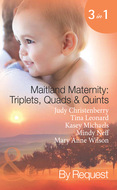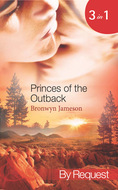Czytaj książkę: «The Ashtons: Walker, Ford & Mercedes»
One outrageous family, three lifetime passions!
THE ASHTONS: WALKER, FORD & MERCEDES
Three of your favourite authors bring you three pulse-racing romances following the scandalous Ashton dynasty
We’re proud to present
MILLS & BOON SPOTLIGHT™
A chance to buy collections of bestselling novels by favourite authors every month – they’re back by popular demand!
May 2010
The Ashtons: Walker, Ford & Mercedes
Featuring
Betrayed Birthright by Sheri WhiteFeather Mistaken for a Mistress by Kristi Gold Condition of Marriage by Emilie Rose
Princes of the Outback
by Bronwyn Jameson
Featuring
The Rugged Loner
The Rich Stranger
The Ruthless Groom
The Ashtons: Walker, Ford & Mercedes
Sheri WhiteFeather
Kristi Gold
Emilie Rose

MILLS & BOON
Before you start reading, why not sign up?
Thank you for downloading this Mills & Boon book. If you want to hear about exclusive discounts, special offers and competitions, sign up to our email newsletter today!
Or simply visit
Mills & Boon emails are completely free to receive and you can unsubscribe at any time via the link in any email we send you.
Table of Contents
Cover Page
Excerpt
Other Books By
Title Page
Betrayed Birthright
About the Author
Map
Prologue
Chapter One
Chapter Two
Chapter Three
Chapter Four
Chapter Five
Chapter Six
Chapter Seven
Chapter Eight
Chapter Nine
Chapter Ten
Chapter Eleven
Mistaken for A Mistress
About the Author
Dedication
Prologue
Chapter One
Chapter Two
Chapter Three
Chapter Four
Chapter Five
Chapter Six
Chapter Seven
Chapter Eight
Chapter Nine
Chapter Ten
Condition of Marriage
About the Author
Dedication
Prologue
Chapter One
Chapter Two
Chapter Three
Chapter Four
Chapter Five
Chapter Six
Chapter Seven
Chapter Eight
Chapter Nine
Chapter Ten
Epilogue
Copyright
Betrayed Birthright
By
Sheri WhiteFeather
Sheri WhiteFeather lives in Southern California and enjoys ethnic dining, attending powwows and visiting art galleries and vintage clothing stores near the beach. When she isn’t writing, she often reads until the wee hours of the morning.
Sheri’s husband, a member of the Muscogee Creek Nation, inspires many of her stories. They have a son, a daughter and a trio of cats – domestic and wild. She loves to hear from her readers. You may write to her at: PO Box 17146, Anaheim, California 92817, USA. Visit her website at www.SheriWhiteFeather.com.

Prologue
1983
Damn David for dying. And damn him for marrying an Indian woman.
Spencer Ashton gazed out the windshield, then blew a frustrated breath. He’d just spent a grueling weekend in Nebraska, taking care of family business. But what choice did he have? Who else would pick up the pieces of David’s crumbled life and offer his half-breed kids a better existence?
That squaw wasn’t fit to raise David’s offspring, and there was no way Spencer would allow her to take them to her freeloading, war-whooping reservation. It was bad enough they’d lived on a farm that had
never prospered, a farm Spencer had helped David buy long before he’d married Mary Little Dove.
But in the end, David had been too proud to admit that he and his family were starving.
Spencer flipped the sun visor, squinting into the afternoon light. He was on his way home from the airport, heading to Napa Valley, California, where he owned a thriving winery and a twenty-two-thousand-square-foot mansion. The boy and girl he’d acquired—his dead brother’s children—sat next to him in the front seat of his luxury sedan.
He glanced over and saw that three-year-old Charlotte was still behaving like a lost bird. She even chirped every so often, grating on his nerves. He’d tried to put her in the backseat, but she wouldn’t leave her big brother’s side. Spencer had no use for wounded creatures, but what could he do? She was David’s daughter.
The eight-year-old boy, on the other hand, had already garnered Spencer’s respect. Walker held his head high. The kid had moxie. Balls. He deserved to be an Ashton.
Too bad he was part Indian.
But Spencer would find a way to get past that. Not that he favored children, Lord knew he had enough of his own. He even had another baby on the way, but Walker was different. He would probably prove to be better than any of Spencer’s kids.
Charlotte made another nervous sound, and Spencer gripped the steering wheel.
“She’s scared,” Walker said.
“Yes, of course. Your parents are gone.” Or so they had been told. Their mother was still alive, but that was Spencer’s secret. Everyone, except his lawyer, had been fed the same story: Mary Little Dove had died from injuries she’d sustained in an automobile accident, just like David.
Spencer and his attorney had strong-armed her into giving up her kids, but it had been the right thing to do.
Walker was proof. The boy looked dapper in the clothes Spencer had purchased for him. And he hadn’t balked about getting his hair cut, either. Spencer wasn’t about to take the kids home looking like a couple of ragamuffins.
He turned to study the boy’s posture. Although he protected his sister, keeping her close, he still had an air of independence. His mother had called him a warrior. A Sioux at heart. But Spencer sensed otherwise. This kid should have been white.
“I was poor when I was young, too,” Spencer said. “But I wanted something better.”
Walker glanced up. “My dad talked about you.”
“Did he?”
“Yes, sir.”
“I would have saved his farm. I didn’t know it was in foreclosure, that he was losing it.” Spencer knew what people said about him: that he was a bastard, a self-righteous prick. But what the hell did they know? He’d always done right by David, even if his kid brother had been a sentimental fool. “I tried to help your dad succeed.”
“And now you’re helping me and Charlotte,” Walker said.
“That’s right, I am. Without me, you and your sister wouldn’t have a home.”
“I’ve been praying for Mom and Dad.”
Normal prayers, Spencer hoped. None of that heathen crap.
Walker glanced out the window. He had a chiseled profile—handsome, in spite of his brown skin. He seemed to be surveying the land, the wealth of the wine country. Spencer suspected he appreciated what he saw. This kid would be grateful for his uncle’s generosity.
“Is my dad going to be buried here?” Walker asked.
“Yes, he is.”
“And my mom?”
“No, son. She’ll be laid to rest on that Indian reservation. The place where she came from. But it’s too far away for you to attend the funeral.”
“I’ve never been there.”
And you never will, Spencer thought. He noticed the eight-year-old’s voice had turned raw, but he wouldn’t dare cry. He was too strong to bawl, to act like a baby. Nope, Walker Ashton wasn’t a sniffling coward.
It was hard to believe that mealy-mouthed Sioux had given birth to him. She’d fallen apart at the seams, no backbone whatsoever. But just to ensure she kept up her end of the bargain, Spencer had arranged a thirty-thousand-dollar payment.
A pittance in his bankbook, a fortune in hers.
As for Walker and Charlotte, he supposed they were worth a few bucks. The boy was, anyway. The timid little girl merely came with the deal.
But it was the best deal either of them would ever get. As far as Spencer was concerned, he’d done himself proud.
One
Walker wished his sister had never found out that their mother was still alive. And worse yet, he wished Charlotte hadn’t convinced him to look for her.
He sat on the edge of his motel-room bed and blew a weary breath. He was staying in Gordon, Nebraska, but he’d been scouting the South Dakota reservation, traveling from district to district, cursing Pine Ridge, a place that encompassed two million acres and some of the poorest counties in the nation.
He would just as soon forget about that Native American hellhole, let alone claim to part of the Oglala Lakota Sioux Nation. While his sister had romantic notions about Indians, Walker was a realist. A liquored-up Native loitering in one of the paltry little towns had called him a stupid iyeska when he’d nearly stumbled over the man’s prone form.
Iyeska.
It was an insult he couldn’t even translate.
Hot and tired, he unbuttoned his shirt and untucked it from his jeans, preparing to take a shower, to wash the grime from his body. He wasn’t used to the sweltering heat, to the depressing vastness of the land.
When a knock sounded, Walker came to his feet, anxiety knotting his stomach. He’d left word with postal workers, BIA employees, anyone who seemed educated enough to listen. He’d even spoken with tribal cops, but no one had been particularly helpful. If anything, they’d treated him with indifference. The way he’d treated them, he supposed.
He answered the door and stared at the woman on the other side. He hadn’t expected his visitor to be young and beautiful. She stood about five-seven, with shoulder-length black hair and exotic brown eyes.
She wore a simple blouse and a pair of nondescript shorts, but her legs—
When she raised her eyebrows at him, he quit checking her out and remembered that his shirt was unbuttoned, exposing his chest and the sweat dampening his skin.
Uncomfortable, he frowned at her, wondering if she thought he was an iyeska, too. Clearly, she was Indian, probably from the reservation.
“Are you Walker Ashton?” she asked.
“Yes.” He wanted to wipe his hands on his jeans. He didn’t like feeling disorganized and dirty. As the interim CEO of Ashton-Lattimer, an investment banking firm in San Francisco, he relied on cell phones, e-mails, fax transmittals and designer suits.
She tilted her head. “I’m Tamra Winter Hawk. I live with Mary Little Dove Ashton.”
His anxiety worsened. Deep down he’d hoped that he wouldn’t find his mom. That he could tell Charlotte that he’d done his best but a family reunion wasn’t meant to be.
He shifted his stance. “How long have you lived with her?”
“Mary took me in when I was a child.”
“I see.” His mom had raised someone else’s kid while his baby sister had longed for maternal affection? That pissed him off, even if the details weren’t clear. “I’d like to speak with her.”
“She’s at work. And she doesn’t know that you’re looking for her. She has no idea you’re here.”
“But you do.” Apparently someone had told Tamra about the city-slick stranger who’d been poking around, driving from one poverty-laden county to the next, claiming to be Mary’s long-lost son. “So what’s the problem? Why are you keeping her from me?”
Tamra didn’t respond. With her striking features and regal posture, she reminded Walker of a museum bronze, an untouchable object encased in glass.
“I’d like to see your ID,” she finally said.
He squinted into the sun, the hot, fiery ball blazing behind her. “What for?”
“To make sure you’re who you say you are.”
Who the hell else would he be? A government agent on the verge of breaking a treaty? Why would he sacrifice his time—his valuable time—to traipse across this godforsaken land if he wasn’t Mary’s son?
He glared at her. If the police hadn’t asked for his ID, then why should she? “I don’t need to prove anything to you.”
“Then maybe I should leave.” Much too elusive, she turned away, her hair spinning in a dark circle.
Walker wanted to let her go, but he knew he couldn’t. Charlotte would never forgive him.
Frustrated, he removed his wallet and followed her into the parking lot. “Hold on.”
Tamra stopped to face him. For a moment he was struck by how easily she’d managed to stir his blood, to fuel his temper.
Walker didn’t let women get under his skin.
Once again she reminded him of a bronze statue. Beautiful, breathtaking, far too aloof. Too bad he’d been taught to behave in museums, he thought. To keep his hands off the glass.
“Will you take it out?” she asked.
Take what out? he wondered, as his brain went numb.
She waited, and he blinked away his confusion. She then asked him to remove his ID from his wallet.
Complying with her request, he handed her his driver’s license. She scanned his identification, studying the photo. He knew it was a lousy picture. But those Department of Motor Vehicles cameras weren’t meant to be flattering.
“Satisfied?” he asked, his unbuttoned shirt sticking to his skin.
She returned his license. “I’ll talk to Mary when she gets home from work.”
“Then what?”
“I’ll call you and let you know when you can see her.”
Right, he thought. Because Mary was queen of the reservation. Or the rez. Or whatever the term for that ghetto plain was.
Aware of his animosity, Tamra sighed. “Your mother has been hurt. I’m only trying to protect her.”
No kidding? Well, he’d been hurt, too. He had no idea why Spencer had lied to him years ago, telling him that his mom was dead. And now Spencer was dead, gunned down by an unknown assailant.
Walker’s emotions were a flat-out mess.
He motioned to his room, where he’d left the door open. “I’ll be here. Do you need the number?”
“No, thanks. I already have it.” She paused, her voice turning soft. “Please don’t be angry, Walker. At least, not at Mary. She never quit missing you and Charlotte.”
His chest constricted, making it tough to breathe.
When he and Charlotte first moved in with Spencer, he used to whisper in the dark, telling her that Mommy and Daddy were angels, watching them from above. But eventually he’d settled into his new life, and he’d quit consoling his sister about the parents they’d lost.
Spencer had become Walker’s mentor, the only person he’d strived to impress. He’d chosen the older man over everyone, including Charlotte, leaving her to fend for herself.
“I’m not angry,” he said. But he was, of course. Somewhere in the pit of his stomach, he was mad as hell.
At himself, at Spencer, at Mary.
And at her, too. Tamra Winter Hawk.
The girl his mother had raised.
While the aroma of beef stew wafted through the house, Tamra helped Mary tidy the living room, dusting, vacuuming and fluffing pillows.
Mary turned off the vacuum and looked around. “This place is dingy, isn’t it? No matter what we do, it’s still an old mobile home.”
“It’s the same age as me. And I’m not old.” Besides, they had cozy furniture, indoor plumbing, heat in the winter and plenty of food in the icebox. To Tamra that was enough.
But she knew how nervous Mary was. She’d been clucking around like a chicken in the rain, preparing for her son but drowning in the fear of seeing him.
“Tell me about him, Tamra. Tell me about Walker.”
What could she say that would put the other woman at ease? “He’ll be here in about an hour, Mary.”
“I know, but I want to know what you thought of him. You never gave me your opinion.”
That was true. She hadn’t told Mary that he’d triggered her emotions. Or that his intensity reminded her of the past, of the years she’d spent in San Francisco, of the man who’d destroyed her heart.
She glanced at Mary, saw that she waited for a response. “He’s stunning.” Tall and lean, she thought, with just the right blend of power, of male muscle. “He was dressed casually.” And she’d noticed his chest, his stomach, the indentation of his navel. “But he doesn’t seem like a casual guy.”
Mary frowned. “You could tell he was rich?”
“Yes.”
“Fancy watch? Designer labels on his clothes?”
Tamra nodded, troubled by the insecurity in the other woman’s eyes. “But you know what?” she said, hoping to soften the blow. “He looks like his dad.” She’d seen photographs of David Ashton. She knew all about the farmer Mary had married. “And he resembles you, too.”
Walker’s mother relaxed a little. “He looked like both of us when he was young.” She paused, took an audible breath. “Do you think he’ll like stew?”
“Sure.” And if he didn’t, she doubted he would say otherwise. He would probably go through the motion of being polite. Of course, he hadn’t been particularly polite with Tamra. But she’d been harsh with him. She didn’t trust his motives, and she suspected he was going to complicate their lives.
Turn their Lakota world on its ear.
Most whitemanized Indians were brash and unyielding. Tamra knew because she’d been one herself. And in some ways she was still struggling with her identity.
“I wonder why he didn’t mention Charlotte,” Mary said. “Are you sure he didn’t say anything about his sister?”
“I’m sure. But you can ask him about her.”
“Yes, of course.” Nervous once again, Mary smoothed her blouse. She’d chosen a floral-printed top and blue pants, an outfit she’d purchased last summer. She didn’t fuss over her clothes and she rarely wore makeup. But this evening she’d put on lipstick. And she’d curled her rain-straight hair.
But even so, she looked older than her fifty-seven years. Her beauty had faded. Tamra had watched it dissipate. Mary had lived a hard life, and the lines in her face bore the brunt of her labor.
The pain of losing her children.
And now Walker was back. A stranger. A man with a distant heart. He hadn’t asked about his mom. Nothing that gave Tamra an indication that he cared.
“I’ll make the salad,” she said, needing to keep busy. The anticipation of entertaining Walker was making her anxious, too.
“I’ll bet he’s used to steak and lobster.” Mary put the vacuum cleaner into the hall closet, then frowned at their cluttered kitchen, at the simplicity of their existence. “Do you think Spencer knows he’s here?”
“I have no idea.” Tamra knew that Spencer Ashton had taken Walker and Charlotte away from their mother. He was responsible for the constant ache in Mary’s chest, for the tears she’d cried.
Tamra washed her hands, running them under the cold water. She couldn’t help being fiercely protective of the woman who’d raised her.
“Is it too hot in here?” Mary asked, stirring the stew. “Should we open another window?”
“It’s starting to cool off. It’ll be okay.”
“Will it?”
“Yes.” She hated the shame that had begun to creep into their minds. Tamra and Mary had strived to accept their lifestyle, to be proud of it.
Mary set the table, but when Walker arrived, she was in the bathroom, reapplying her lipstick.
Tamra answered the knock on the screen door, and for a moment she and Walker gazed at each other through the barrier.
He didn’t smile. He looked impeccably groomed in a tan shirt and matching trousers. He was cleanly shaven and his short dark hair was combed away from his face, exposing his half-blood features.
Tamra’s pulse zigzagged, like invisible footprints racing up her arm.
The last man who’d had that kind of effect on her had given her a child. A baby she’d buried in San Francisco, the city where Walker lived.
“Come in,” she said, opening the screen door. It wasn’t a fluke that Tamra was connected to San Francisco. That she’d spent her college years there. She’d chosen that region because of Walker and his sister.
“Thanks.” He entered the house, then handed her a bouquet of roses. “I was going to bring a bottle of wine, but since they don’t sell alcohol on the reservation, I figured you weren’t allowed to indulge in it, either.” He paused, shrugged a little. “But I’ve seen plenty of people drinking. I guess everyone doesn’t follow the rules.”
She merely nodded. The white-owned liquor stores in the border towns catered to Lakota drunks. His mother was far too familiar with that scenario to think of alcohol as a luxury, even an exceptional bottle of wine. Mary’s brother had died from alcoholism. “Your mom will appreciate the flowers.”
“Where is she?”
“Freshening up. She’ll only be a minute.”
Or a second, she thought, as Mary appeared in the hallway.
Walker turned around, and Tamra watched mother and son face each other for the first time in twenty-two years.
Tears filled Mary’s eyes, but she didn’t step forward to hug her boy. He didn’t embrace her, either.
Awkward silence stretched between them.
Walker didn’t know what to say. Mary didn’t look familiar. But he didn’t have any old pictures, nothing to refresh his memory.
Was he a coldhearted bastard? Or was it normal that he didn’t feel anything? That Mary Little Dove didn’t seem like his mother?
When she blinked, the tears that were gathered on her lashes fluttered like raindrops. Should he offer her his handkerchief? Or would that trigger even more tears? Walker didn’t want to make her cry.
He moved forward, just a little, stepping closer to her. Why had his memories faded? Why couldn’t he see her in his mind? He remembered the farm, but he couldn’t recall his mom.
Because it had been easier to forget, he thought. Easier to let her go, to get on with his life.
“My son,” Mary said, breaking the silence. “My boy. I never thought I’d see you again. But here you are. So tall. So handsome.”
A muscle clenched in his jaw. “We thought you were dead.”
“I know.” The tears glistening on her lashes fell, dotting her cheeks. “I’m aware of what Spencer told you.”
She knew? She’d been part of the lie? Walker wanted to turn away, to shut her out of his life once again, but his feet wouldn’t move. He simply stood there, the weight of her words dragging him down.
“Is Charlotte all right?” she asked. “Does she know you came to see me?”
“My sister is fine, and this was her idea.”
Mary pressed her hand against her heart. “My baby girl. She was only three years old. How could she possibly remember me?”
Walker didn’t respond. But how could he? He didn’t remember her, either. And, God help him, he didn’t want to. He had no desire to become her son, to be part of Pine Ridge, to embrace his Lakota roots.
Spencer had taught him that being Indian didn’t matter. And from what Walker had seen so far, he had to agree.
He glanced at Tamra and saw that she watched him. Could she sense his thoughts? She clutched the roses he’d brought, and the bouquet made her look like a reservation bride, with a summer cotton dress flowing around her ankles.
“These are from Walker.” She handed the roses to Mary.
His mother accepted the gift and smiled.
Walker took a deep breath. She looked pretty when she smiled. Softer, like the woman his father had probably fallen in love with. David Ashton had been a sentimental man, that much he knew. That much Spencer had told him.
“Thank you,” Mary said to Walker.
He gave her a quick nod. “You’re welcome.”
“I’ll make you a shield.” She searched his gaze. “Your dad always wanted you to have one.”
His white father wanted him to have a Lakota object? Walker didn’t understand, but he tried to pretend that it made sense. He had no idea what he was supposed to do with a shield.
Declare war on another tribe? Hang it on his living room wall? Somehow he didn’t see it complementing his contemporary decor. An interior designer had spent months laboring over his hillside condo.
Tamra spoke up. “The meal is ready. We should probably eat now.”
“Yeah, sure.” Anything to divert his mother’s attention, he thought. To make her forget about the shield.
“I’ll put these in water.” Mary took the flowers into the kitchen, where a simple table presented casual china, paper napkins and stainless steel flatware.
Walker waited for the women, intending to push in their chairs. But his mom tapped his shoulder and told him to sit, anxious to serve him. When she filled his glass with milk, he wondered if she’d forgotten that he was no longer eight years old.
Finally Mary and Tamra joined him, and they ate a hearty stew, an iceberg lettuce salad and rolls smothered in butter. It was the kind of meal a farmer’s wife would prepare, he thought. Middle America. Only this was a South Dakota reservation.
He looked across the table at his mom. At Mary. His mind kept bouncing back and forth. He didn’t know what to call her. How to refer to the woman who’d given him life.
“Did Spencer treat you well?” she asked.
He blinked, tried not to frown. “Yes. I was close to my uncle.” And probably the only Ashton who could make that claim. No one had forged a bond with Spencer, not the way Walker did. But even so, it had been a hard-earned alliance. Spencer had been a complicated man.
“You’re not close to him anymore?”
“Spencer is dead. He was murdered a few months ago. Shot to death in his office. Charlotte found his body.”
“Oh, my. Oh.” His mom fidgeted with her food. “I’m sorry. I’m so sorry.”
When she stopped talking, the walls closed in. The kitchen was already cramped, the table too small for three people. Tamra sat next to him, too close for comfort.
He was still mourning his uncle, still missing him. Yet Spencer’s betrayal kept him awake at night.
“Will you tell me about Charlotte?” Mary said.
He nodded, knowing how much this mattered to his sister. “She’s engaged to Alexandre Dupree, a winemaker from France. He isn’t the kind of man I’d envisioned for her, but they’re crazy about each other.” Madly in love, he supposed. “My sister was always shy, sort of dreamy. And Alexandre is—” he paused, trying to find a word to describe Charlotte’s fiancé “—worldly.”
“Like a prince.” Mary sighed, already slipping into her daughter’s fairy tale.
“I guess, yeah. Women probably think so.” Walker knew that Alexandre had given his sister everything she needed, including the strength to investigate their family, to discover that Mary was still alive. “They’re in Paris. Charlotte needed to get away after Spencer’s funeral. But she made me promise that I’d search for you.”
“I’m glad she did.” Mary’s eyes were watery again. “Do you have a picture of her?”
He shook his head. “I didn’t think to bring one. But I’m sure she’s going to rush back to meet you. Her and Alexandre.”
“I can’t wait to see her. And her fiancé, of course.” Mary scooted closer to the table. “Is there someone special in your life, son?”
“Me?” Without thinking, he glanced at Tamra. She turned toward him, and he shifted in his seat, wondering if she had a significant other, if she was sleeping with some big Indian buck.
Then he recalled the blonde in a San Francisco bar who’d tried to pin that phrase on him. A racial slur that had made him feel dirty.
“I’m not involved with anyone,” he said. “I’m too busy with my career. Investment banking.” More than ready to change the subject, he questioned his mom. “So, what kind of work do you do?”
She smoothed her gray-streaked hair. “I’m a nurse’s aid at the PHS.”
“PHS?”
“Public Health Service Hospital.” She sat up a little straighter, proud of her job. “It’s easier for me than some of the other aids. I lived in the white world, so I have a better understanding of the white doctors and nurses who work there.”
Tamra interjected. “Most of the doctors are young. Physicians who received government loans for medical school. So they’re paying back those loans by performing public health services on the reservation for a few years.”
And probably hating every minute of it, he thought.
Tamra continued, “Our society equates wisdom with age, so it’s difficult for our elders to accept young doctors. And there’s often a language barrier. Far too many cultural differences.” She glanced at his mom. “Mary is a valuable asset. The patients trust her. And so do the nurses and doctors.”
Unsure of how to respond, he ate another a bite of stew. Mary sounded like a caring woman, yet she’d allowed her children to believe she was dead. He wanted to grill her about the past, to bombard her with accusations, but having Tamra nearby complicated the situation even more.
She’d taken his place. She’d been raised by the lady who’d let him go. And worse yet, he was attracted to Tamra.
A disaster in the making.
When he reached for his drink, he brushed her arm, a touch that made him much too aware.
“Sorry,” he said. “I’m left-handed.”
“It’s okay.” She tried to move away from him, to give him more room, but her effort proved useless. There was nowhere to go. They were stuck.
Yet his mother was smiling. “Walker used to do that when he was little, too.”
“You mean this?” He lifted his milk, bumping Tamra’s elbow, nearly knocking the roll out of her hand.
Everyone laughed. A silly incident. But it felt good. He hadn’t laughed in a long time.








